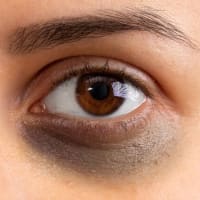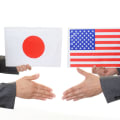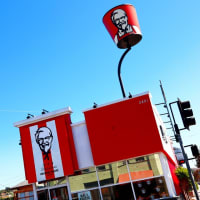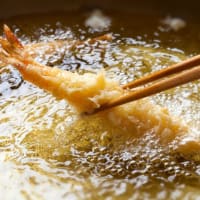Dali In Japanese, there are thousands of “double-sound” words.
ダリちゃん 日本語には山ほど「重複ことば」があるね。
Me Ah, Dali. What on earth do you mean by the “double-sound” words?
私 あーダリちゃん。「重複ことば」っていったい何?
Dali Such as wan-wan, nyan-nyan, baa-baa, sara-sara, hara-hara, pika-pika, goro-goro, kapo-kapo, miki-miki, kona-kona… . But in English, “double-sound” words are very rare.
ダリちゃん ワンワン、ニャンニャン、バアーバアー、サラサラ、ハラハラ、ピカピカ、ゴロゴロ、カポカポ、ミキミキ、コナコナ……。でも英語には「重複ことば」はとても珍しい。
Me Yowza!
私 そうなんだ!
Dali However, when talking to babies, we might often use double-sound words. Here is an example. In Japanese, we say Okaasan, and in English, we say “mother.” Some younger children may say, “mommy.” But for babies, we teach them “mama.” And father is daddy. But for babies, we say…
ダリちゃん でも赤ちゃんにしゃべりかける時、わしらは「重複ことば」をよく使う。例えばね、日本語の「お母さん」は英語ではmotherだ。幼い子供はmommyというかも。でも赤ちゃんに対してはmamaと言うんだよと教える。それで父親はdaddyだ。でも赤ちゃんに対しては……
Me I know, I know! It’s papa!!
私 知ってる、知ってる! パパだよ!
Dali No, no, no, no, never! You fool! Okaasan is mama because “ma” is short for mommy. For Otousan, we say daddy. So the baby talk for Otousan is “dada,” not papa.
ダリちゃん ちゃう、ちゃう、違うって! バカ! 「お母さん」はmama。maはmommyの省略形。「お父さん」はdaddy。だから「お父さん」に相当する赤ちゃん言葉はdada。パパじゃないんだ。
Me Yowza!
私 ふぇ~!
Dali When we gaijins hear a Japanese adult calling his mother or wife “mama,” we ask him, “Are you a baby?”
ダリちゃん わしら外国人が日本人の大人が自分の母親や奥さんを「ママ」って呼ぶのを聞くと「あなたは赤ちゃん?」って尋ねたくなる。
Me I always call the female owner of an izakaya “mama.”
私 僕はいつも居酒屋の女将のこと「ママ」って呼ぶけど?

ダリちゃん 日本語には山ほど「重複ことば」があるね。
Me Ah, Dali. What on earth do you mean by the “double-sound” words?
私 あーダリちゃん。「重複ことば」っていったい何?
Dali Such as wan-wan, nyan-nyan, baa-baa, sara-sara, hara-hara, pika-pika, goro-goro, kapo-kapo, miki-miki, kona-kona… . But in English, “double-sound” words are very rare.
ダリちゃん ワンワン、ニャンニャン、バアーバアー、サラサラ、ハラハラ、ピカピカ、ゴロゴロ、カポカポ、ミキミキ、コナコナ……。でも英語には「重複ことば」はとても珍しい。
Me Yowza!
私 そうなんだ!
Dali However, when talking to babies, we might often use double-sound words. Here is an example. In Japanese, we say Okaasan, and in English, we say “mother.” Some younger children may say, “mommy.” But for babies, we teach them “mama.” And father is daddy. But for babies, we say…
ダリちゃん でも赤ちゃんにしゃべりかける時、わしらは「重複ことば」をよく使う。例えばね、日本語の「お母さん」は英語ではmotherだ。幼い子供はmommyというかも。でも赤ちゃんに対してはmamaと言うんだよと教える。それで父親はdaddyだ。でも赤ちゃんに対しては……
Me I know, I know! It’s papa!!
私 知ってる、知ってる! パパだよ!
Dali No, no, no, no, never! You fool! Okaasan is mama because “ma” is short for mommy. For Otousan, we say daddy. So the baby talk for Otousan is “dada,” not papa.
ダリちゃん ちゃう、ちゃう、違うって! バカ! 「お母さん」はmama。maはmommyの省略形。「お父さん」はdaddy。だから「お父さん」に相当する赤ちゃん言葉はdada。パパじゃないんだ。
Me Yowza!
私 ふぇ~!
Dali When we gaijins hear a Japanese adult calling his mother or wife “mama,” we ask him, “Are you a baby?”
ダリちゃん わしら外国人が日本人の大人が自分の母親や奥さんを「ママ」って呼ぶのを聞くと「あなたは赤ちゃん?」って尋ねたくなる。
Me I always call the female owner of an izakaya “mama.”
私 僕はいつも居酒屋の女将のこと「ママ」って呼ぶけど?

Izakaya Mama
Dali Are you a baby? Imagine a mother holding her baby and the baby’s grandmother leaving for home after a nice visit. When Grandma says, “Goodbye, Jennifer,” Mother takes Jennifer’s hand and waves it for the baby while teaching the baby the word “bye-bye.” “Bye-bye” is extremely childish. It’s almost exclusively used for and by babies.
ダリちゃん イナちゃんは赤ちゃんですか? 母親が自分の赤ちゃんを抱いていて、赤ちゃんのおばあちゃんが彼女らと楽しい時間を過ごした後帰るシーンを想像してみて。おばあちゃんが「さよならジェニファーちゃん」と言うと、母親はジェニファーの手をとって「バイバイ」を赤ちゃんに教えながら振る。「バイバイ」はとても子供じみた言葉。ほぼ、赤ちゃんでしか使わない。
Me But I’ve seen gaijin teachers on English education programs say “Bye-bye” to the viewers at the end of the program.
私 でも英語の教育番組で外国人の先生が番組の終わりに視聴者に向かって「バイバイ」って言ってたよ。
Dali Here’s the reason. Because the program producer told him to do so. Indeed, it’s not natural, but the program was targeted at Japanese people. So the producer said, “Oh, Michael, say ‘Bye-bye for now’ as a closing farewell.” Michael was embarrassed and ashamed but did as he was told because it was a job, and he was getting paid. Some natural expressions in this situation might be “goodbye for now,” “bye for now,” or just “bye,” but not “bye-bye for now,” which is very baby talk.
ダリちゃん 理由はね、番組のプロデューサーが彼にそうしろと言ったからなんだよ。確かに、自然な表現じゃないけど、番組は日本人がターゲットでしょ。で、プロデューサーは「なあ、マイケル終わりのお別れに『バイバイ・フォア・ナウ』て言ってくれよ」と言う。マイケルはバツが悪くて恥ずかしかったけど言われた通りにした。だって仕事だしお金がもらえるもの。この場合、自然な表現はgoodbye for now、bye for nowか単にbyeであって、バリバリ赤ちゃん言葉のbye-bye for nowではない。
Keywords(キーワード)
extremely: きわめて、とても、すこぶる
exclusively: もっぱら、独占的に、排他的に
embarrassed: きまり悪がる、当惑した、困った
ashamed: 恥ずかしく思って、恥じて
onomatopoeia: オノマトペ、擬音語、擬態語
entity: 実体、存在
Comments(コメント)
Japanese has many “double-sound” words because they contain many onomatopoeias, such as sara-sara, fua-fua, and chiku-chiku. Interestingly, American babies utter “dada” instead of “papa.”
Which is learned first, “mama” or “dada”? The answer is “dada.” Why? Many researchers believe babies say “dada” before “mama” because “da” sounds are easier for babies to produce. Other researchers say that “mama” follows “dada” because the father is the first person a baby sees as separate from himself. The baby does not yet see “mama” as a separate entity from himself.
日本語にはたくさんの「重複ことば」があるのは、サラサラ、フアフア、チクチクなどの多くのオノマトペを含むから。面白いことにアメリカの赤ちゃんは「パパ」と言うかわりに「ダダ」と言う。
「ママ」と「パパ」のどちらが先に覚えられるでしょうか。答えは「パパ」。なぜ? 多くの研究者は、赤ちゃんが「ママ」より先に「パパ」を言うのは、「ダ」の音の方が発音しやすいからであると考えている。他の研究者は、赤ちゃんが自分とは別の存在として最初に見るのは父親であるため、「パパ」の後に「ママ」が続くと言う。赤ちゃんはまだ「ママ」を自分とは別の存在として見ていない。
ダリちゃん イナちゃんは赤ちゃんですか? 母親が自分の赤ちゃんを抱いていて、赤ちゃんのおばあちゃんが彼女らと楽しい時間を過ごした後帰るシーンを想像してみて。おばあちゃんが「さよならジェニファーちゃん」と言うと、母親はジェニファーの手をとって「バイバイ」を赤ちゃんに教えながら振る。「バイバイ」はとても子供じみた言葉。ほぼ、赤ちゃんでしか使わない。
Me But I’ve seen gaijin teachers on English education programs say “Bye-bye” to the viewers at the end of the program.
私 でも英語の教育番組で外国人の先生が番組の終わりに視聴者に向かって「バイバイ」って言ってたよ。
Dali Here’s the reason. Because the program producer told him to do so. Indeed, it’s not natural, but the program was targeted at Japanese people. So the producer said, “Oh, Michael, say ‘Bye-bye for now’ as a closing farewell.” Michael was embarrassed and ashamed but did as he was told because it was a job, and he was getting paid. Some natural expressions in this situation might be “goodbye for now,” “bye for now,” or just “bye,” but not “bye-bye for now,” which is very baby talk.
ダリちゃん 理由はね、番組のプロデューサーが彼にそうしろと言ったからなんだよ。確かに、自然な表現じゃないけど、番組は日本人がターゲットでしょ。で、プロデューサーは「なあ、マイケル終わりのお別れに『バイバイ・フォア・ナウ』て言ってくれよ」と言う。マイケルはバツが悪くて恥ずかしかったけど言われた通りにした。だって仕事だしお金がもらえるもの。この場合、自然な表現はgoodbye for now、bye for nowか単にbyeであって、バリバリ赤ちゃん言葉のbye-bye for nowではない。
Keywords(キーワード)
extremely: きわめて、とても、すこぶる
exclusively: もっぱら、独占的に、排他的に
embarrassed: きまり悪がる、当惑した、困った
ashamed: 恥ずかしく思って、恥じて
onomatopoeia: オノマトペ、擬音語、擬態語
entity: 実体、存在
Comments(コメント)
Japanese has many “double-sound” words because they contain many onomatopoeias, such as sara-sara, fua-fua, and chiku-chiku. Interestingly, American babies utter “dada” instead of “papa.”
Which is learned first, “mama” or “dada”? The answer is “dada.” Why? Many researchers believe babies say “dada” before “mama” because “da” sounds are easier for babies to produce. Other researchers say that “mama” follows “dada” because the father is the first person a baby sees as separate from himself. The baby does not yet see “mama” as a separate entity from himself.
日本語にはたくさんの「重複ことば」があるのは、サラサラ、フアフア、チクチクなどの多くのオノマトペを含むから。面白いことにアメリカの赤ちゃんは「パパ」と言うかわりに「ダダ」と言う。
「ママ」と「パパ」のどちらが先に覚えられるでしょうか。答えは「パパ」。なぜ? 多くの研究者は、赤ちゃんが「ママ」より先に「パパ」を言うのは、「ダ」の音の方が発音しやすいからであると考えている。他の研究者は、赤ちゃんが自分とは別の存在として最初に見るのは父親であるため、「パパ」の後に「ママ」が続くと言う。赤ちゃんはまだ「ママ」を自分とは別の存在として見ていない。






















